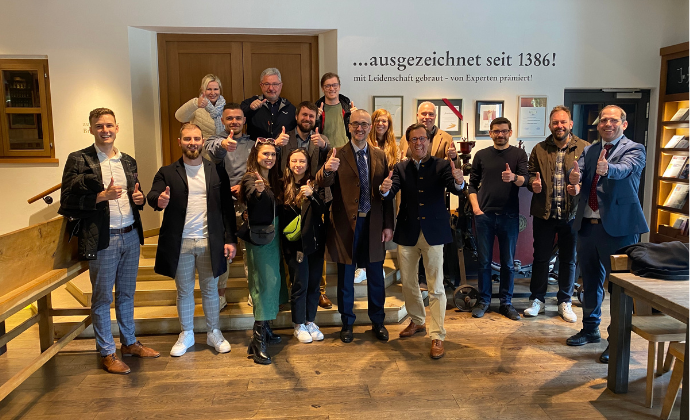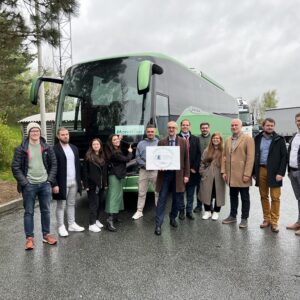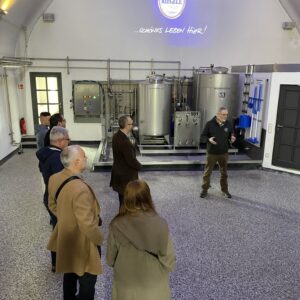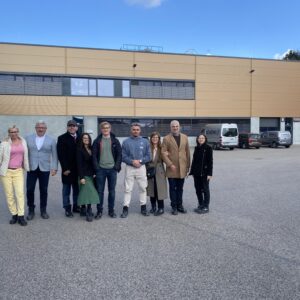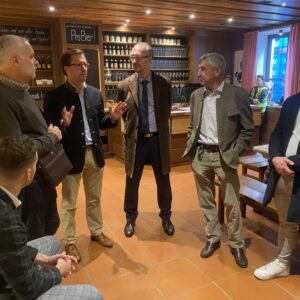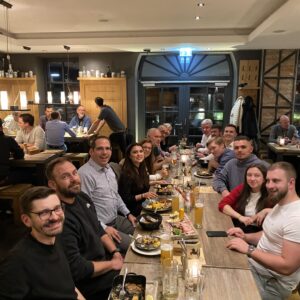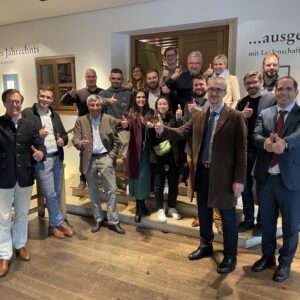On a visit to German centuries-old family businesses
On Thursday 18 April, the Centre for Family Business organised a two-day trip to Bavaria in Germany. During the trip, which was attended by representatives of the CRF community together with Jiří Hnilica and Martin Jurek from CRF, we visited two family businesses with a long tradition: SCHLENK, founded in 1879, and Brauhaus Riegele, one of the oldest breweries in Germany, whose history dates back to 1386.
SCHLENK produces metal effect pigments, aluminium, copper, and copper alloys in powder form for technical purposes as well as metal foils and strips for a wide variety of industries: printing, plastics, cosmetics, building materials, chemical and more. Its products are also ubiquitous in our everyday life. They are part of iPhones, shiny UVEX helmets and Coca-Cola caps. Pigments are also in metallic car paints, eye shadows and PV panels.
We were given a tour of the family company by its CEO Joachim von Schlenk-Barnsdorf and his cousin, Achim Poensgen, Communications & Corporate Marketing. Joachim has been managing the enterprise in the fourth generation. During our visit, Joachim’s daughter Sophie and son Christopher joined us, so we had the opportunity to meet the future fifth generation of the family. “Having a family business is quite risky for a family and family relationships. And the fact that we take this risk means that family is an asset not a roadblock in our business,” the current CEO said when asked if he sees family in business as an advantage or a complication.
The family company SCHLENK was founded in 1879 by Carl Schlenk as a factory for the wrought iron production. After the First World War, his sons Arthur and Wilhelm took over the largest company in this sector. They guided the company through the crisis between the wars and the war years. In the second half of the 20th century, the 3rd generation of the family took the helm and the company focused on developing a new technology to produce aerated aluminium powder. In the 1970s, SCHLENK began producing foils with a thickness of 7-8 microns. In the 1990s, it opened one of its plants also in the Czech Republic in Bojkovice (the Zlín region). The company is currently co-owned by 10 family members who meet once a year. The CEO is selected by the supervisory board, whose members are chosen by the family. Currently, two family members, Eckhard Wilhelm Mehring and Arno Scharowskysit on the board. The family has a written agreement, the “family contract”, which all members accept.
Interestingly, SCHLENK is one of the companies called “hidden champions”. These are large and important companies, but their names are not well known. Mostly because they operate in the B2B segment and are not very “relevant” for the end customer. However, it is on such companies that the current German economy is built and regular rankings of the biggest “hidden champion” companies are published.
Also for the socialization part of the CRF trip we chose a family business, one of the oldest breweries in Germany, Brauhaus Riegele. Sebastian Priller-Riegele, a representative of the 28th generation of brewers, guided us through the business, which has been in operation since 1386.
Traditional brewing is an important part of the family business, which today stands on 4 pillars: beer production, sales of different beers and lemonades, offering experiences connected with the brewery’s unique location (a unique climbing park on the brewery premises, which includes climbing and jumping from the brewery chimney, beer brewing classes, beer yoga, and more), real estate.
The family business now has 18 co-owners. “The oldest descendant has the right, but not the obligation, to be the next CEO. If he does not exercise this option, it passes to the younger descendants in turn. The incoming generation must be able to listen to and respect the older generation. And the older generation must be able to step aside and no longer interfere with the leadership of the younger family members,” Sebastian described the most important succession rules of his family. In order for family members to be involved in leadership, it is also necessary to have a relevant education and to meet the requirement of at least five years of employment outside the family business.
Meeting long-lived family businesses is always very rewarding. The approach of German family firms shows their confidence in the steps and rules of family business. It stems from their multiple experiences in passing on the company to the next generation, which can also be an inspiration for Czech family companies.
